
|
STUDDY GEORGE E.: (1878-1948) British Artist, famous for his creation of Bonzo the dog in the 1920s. Vintage signed postcard, the colour image being a reproduction of an illustration by Studdy depicting a dog seated among various plates and cutlery having pulled the cloth from a dinner table, and with the printed caption There You are Then to the lower white border. Signed ('G E Studdy') in dark fountain pen ink with his name alone to the lower white border. VG £100 - 120
|
|

|
SEUSS DR: (1904-1991) American Writer and Cartoonist, remembered for his children's books including The Cat in the Hat. Book signed and inscribed, a hardback edition of How The Grinch Stole Christmas!, published by Random House, New York, 1957. Signed by Dr. Seuss to the verso of the half title page in blue ink. Lacking the dust jacket. With a bookplate affixed to the pictorial front free endpaper. Some light overall age wear, about VG £200 - 300
|
|

|
JUDGE DREDD: A good original 14 x 10.5 piece of original colour artwork by artist Ian Gibson for the front cover of The Judge Dredd Collection 5, published on 1st August 1990. Signed by Gibson to the lower border in ink. With a few ink publication notes and tape stains etc. (one covering a small tear) to the borders. G £80 - 100
|
|

|
BARRIE J. M.: (1860-1937) Scottish Novelist, created Peter Pan. A.L.S., J. M. Barrie, one page, 8vo, Scourie, Sutherland, 19th September 1911, to Mrs. Havelock Ellis. Barrie grants his correspondent permission to use some lines from one of his books, remarking 'I daresay they are correct. I don't have a copy at hand'. Together with Pauline Chase (1885-1962) American Actress who played one of the Lost Boys in the premiere of Peter Pan in London in 1904 and was later selected by Barrie to play the title role, which she did from 1906-13. A.L.S., Pauline Chase, two pages, 8vo, Southport, 14th February 1914, to Mr. Kapp, on the printed stationery of the Queen's Hotel. Chase announces '"Peter Pan" will try and get the pipes for you after the tour' and further adds that she is sorry that she could not sing Shadow Song on the last night as 'the lost boys didn't know it'. Two small file holes to the upper left corner of Barrie's letter, not affecting the text or signature, and some light age wear to Chase's letter. VG, 2 £150 - 200
Edith Ellis (1861-1916) British Writer and Women's Rights Activist. Wife of the sexologist Havelock Ellis.
|
|

|
BLYTON ENID: (1897-1968) British Children's Writer. Fountain pen ink signature ('love from Enid Blyton') on an attractive green deckle edged card. Together with a set of five Royal Mail postage stamps commemorating the works of Enid Blyton, including Noddy and the Famous Five, contained in a presentation pack. VG to EX, 2 £80 - 100
|
|

|
BLYTON ENID: (1897-1968) British Children's Writer. An interesting T.L.S., Enid Blyton, one page, folio, Beaconsfield, Buckinghamshire, 10th July 1952, to Messrs. G. Ricordi & Co. Ltd. Blyton informs her correspondents that a Company is in the process of being formed 'for the purpose of granting Licences in respect of the character "Little Noddy"' and continues to state that the Company will grant an exclusive licence to Ricordi & Co., so that they may publish the lyrics to thirteen songs which Blyton lists and which include Come to Toyland, Noddy's Hat, Noddy's Morning Song, Noddy is Lost and Noddy's Car. Blyton further states that the licence will be for a period of ten years and sets out five conditions including a royalty payment of 10% 'of the marked selling price on every copy of the said Lyrics…sold in Great Britain…and that you will pay in respect of all other countries a royalty at the rate of 5% on the said selling price. That in respect of any reproduction made on any mechanical instrument or used in sound film production, you will pay…a royalty of one-third of all monies received by you…It is understood that you will, as soon as practicable, publish a first edition of not less than 3,000 copies…' A letter of good content illustrating the business side of Blyton's work. Two file holes to the left edge and some light folds, about VG £150 - 200
|
|

|
MILNE CHRISTOPHER: (1920-1996) Son of author A. A. Milne, the basis of the character Christopher Robin in his father's Winnie-the-Pooh stories. Signed colour 4 x 6 postcard, the image being a reproduction of an artist's illustration depicting Christopher Robin on a swing, with Winnie-the-Pooh and Piglet beneath him. Signed by Milne in blue ink across a light area and dated 1st May 1994 in his hand. Scarce. EX £80 - 100
|
|

|
AWDRY WILBERT: (1911-1997) English Anglican Cleric, Railway Enthusiast and Children's Author, creator of Thomas the Tank Engine. Small series of three T.Ls.S., W. Awdry, each one page, 4to, Stroud, Gloucestershire, 18th April & 10th May 1995 and 3rd January 1966, all to Carolyn Date, on personal printed stationery featuring an illustration of a railway engine. Awdry writes to his correspondent concerning his health and stating that he has no photographs of himself, 'If it is that you wish to know what I look like, I would refer you to "The Island of Sodor" centre pages….where I am shown drawn from life…', commenting on a photograph in which he wears a sweater featuring Thomas the Tank Engine, 'Yes, the sweater was specially made for me. I did not like the red background, so they made one for me on a grey background', and in the final letter sending his thanks to his correspondent for her congratulations on his OBE award. Together with a signed colour 12 x 8 photograph (being the one referred to by Awdry in his letter) of the author in a head and shoulders pose. Signed with his name alone in black ink to a clear area of the image. Also including an A.N.S., W Awdry, on an attractive 12mo card, n.p., n.d., in full, 'Many thanks for your kind remarks about my little books, with good wishes'. VG to EX, 5 £100 - 150
|
|

|
DAHL ROALD: (1916-1990) British Novelist, remembered for his children's books. Scarce signed 5 x 7 photograph of Dahl seated in a three quarter length pose holding two dogs in his lap. Signed with his name alone in bold blue ink to the lower white border. Together with Leslie Charteris (1907-1993) Chinese-English Writer, creator of Simon Templar ('The Saint'). Red ink signature and inscription on a white card, with an additional pin sketch of The Saint and date 1988 in his hand. Also including a signed colour 4 x 6 photograph by pianist Vladimir Ashkenazy and a signed 5 x 7 photograph by Formula One World Champion John Surtees. VG to EX, 4 £80 - 100
|
|

|
ROWLING J. K.: (1965- ) British Author of the Harry Potter books. Book signed, a hardback edition of Harry Potter and The Order of The Phoenix, First Edition published by Bloomsbury, London, 2003. Signed by Rowling with her name alone in bold black ink to the title page. Accompanied by the dust jacket. Together with Sarah, Duchess of York (1959- ) Former wife of Prince Andrew, Duke of York 1986- 96. Book signed and inscribed, a hardback edition of My Story, First Edition published by Simon & Schuster Ltd., London, 1996. Signed in bold black ink to the title page and dated 28th November 1996 in her hand. Accompanied by the dust jacket. G to VG, 2 £200 - 300
|
|

|
SEWARD ANNA: (1747-1809) English Romantic Poet. Ink signature ('A. Seward') and fourteen lines of holograph text, to the recto and verso, on a slim oblong 12mo piece neatly removed from the conclusion of a letter to Mr. [Edward] Sneyd. Seward's text reads, in part, 'I have a blamable impetuosity in my temper which often hurries me into speaking my sentiments too freely, even when they are oppos'd by those for whose judgements I have the highest veneration. The intimacy & connection which has always subsisted between you, & my Father & Mother has made me look upon your children as my sisters, I love them all, but for Honora & for my poor Nancy I had the warmest affection, in the first I promise myself such future happiness…..' and in a postscript Seward writes 'Poor little Honora full of sorrow sends her duty to you'. An interesting association piece. A couple of small, light stains, just affecting a few words of text (which remain perfectly legible) but not the signature. About VG £200 - 300
Edward Sneyd (d.1776) Major in the Royal Horse Guards.
In 1764 Anna Seward's sister, Sarah, died and subsequently Canon and Mrs. Seward, Anna and Sarah's parents, adopted Honora Sneyd (1751-1780). Sneyd was nine years younger than Anna, and the two shared a household for thirteen years. Anna and Honora formed a close attachment; when Honora's father had her return to his household when she was nineteen, Anna was stricken, though relieved that Honora did not move far away and they could still spend time together.
|
|
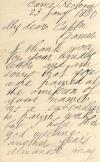 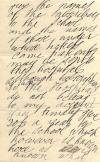 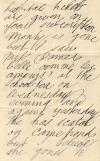 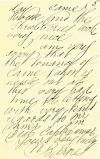 |
BARNES WILLIAM: (1801-1886) English Writer & Poet, particularly in the Dorset dialect. Friend of Thomas Hardy and Alfred Tennyson. A.L.S., W. Barnes, four pages, 8vo, Came Rectory, 23rd January 1880, to Captain Damer. Barnes thanks his correspondent for their letter and remarks that he is 'sorry that you were pained at the omission of your name as a subscriber to parish work but I hope that God willing another year's almanack may give the names of the subscribers to the school and the names of those under whose tickets Came patients may be sent to the hospital although subscription as such to the Hospital do not belong to my account' and continues 'You kindly give 20£ a year to the school which however is known here as is known what hospital tickets are given on your subscription'. In concluding Barnes refers to Damer's daughter whom he saw at a School tea on Wednesday and whom has 'scated on Came pond'. Scarce. VG £200 - 300
Barnes served as rector of St Peter's Church at Winterborne Came in Dorset from 1862-86. He is buried in the churchyard there beneath a Celtic cross.
|
|

|
TENNYSON ALFRED: (1809-1892) English Poet Laureate. D.S., A Tennyson, being a signed cheque, the text in the hand of his wife, Emily, penned on an oblong 8vo sheet of notepaper, Freshwater, 5th July 1865. The cheque is drawn on Olding, Osborne & Co. of London, and is made payable to Charles Heard for the sum of £30.0.0. With a One Penny Revenue stamp affixed in the upper right corner and several bank cancellations, one only very lightly affecting Tennyson's signature. Some light overall creasing and minor age wear, about VG £100 - 150
|
|

|
KIPLING RUDYARD: (1865-1936) English Author, Nobel Prize winner for Literature, 1907. A.L.S., Rudyard Kipling, one page, 8vo, Cirencester Park, Cirencester, n.d. ('Friday'), to Mrs. [Welbore St. Clair] Baddeley. Kipling states that he is writing on behalf of his wife to 'say how very sorry we are to have missed you yesterday and not to be able to come to you as you kindly suggest', further explaining that they have to return home as they are expecting friends, and concluding 'It is very bad luck all round and we can only hope to repair it later'. Accompanied by the original envelope hand addressed by Kipling and signed by him with his initials ('RK') to the lower left corner. VG £150 - 200
Welbore St. Clair Baddeley (1856-1945) English Poet, Dramatist, Traveller and Gloucestershire Historian.
|
|

|
KIPLING RUDYARD: (1865-1936) English Author, Nobel Prize winner for Literature, 1907. T.L.S., Rudyard Kipling, one page, oblong 8vo, Bateman's, Burwash, Sussex, 19th April 1909, to the editor of The Englishwoman, ('Dear Madam'), marked Private. Kipling states that he has only just returned to England to find his correspondent's letter and copies of the magazine, remarking 'I am afraid I cannot give you the help you ask as I have no belief in the objects for which your magazine appears to be founded'. A couple of light stains, just affecting a few words of text, but not the signature, and some light creasing, G £100 - 120
|
|

|
KIPLING RUDYARD: (1865-1936) English Author, Nobel Prize winner for Literature, 1907. An interesting T.L.S., Rudyard Kipling, one page, 4to, Bateman's, Burwash, Sussex, 15th May 1918, to George Bainton. Kipling thanks his correspondent for their letter and interesting enclosure from Bainton's son, and continues to remark 'Now that he is in Holland, with a reasonable certainty of seeing English newspapers, he will be better able to understand the position in regard to prisoners of war, both civil and military'. Kipling adds that the conditions have been modified several times and that Lord Newton's most recent proposals, published in The Times, cover the points made by Bainton's son, further stating 'You will also see that he is mistaken in thinking that at the date of his letter, "soldiers were automatically released as soon as they had passed their eighteen months in a prison camp". As I understand it, this ruling up to the present has only applied to officers and non-commissioned officers, and only very recently to them. I hope that this new ruling will meet all the difficulties, and that the prisoners in Germany may look forward to internment in neutral countries'. A tear to the lower left corner has previously been professionally repaired although now has some staining, only just affecting the name of Kipling's correspondent, and not the main body of text or the signature. G £150 - 200
Kipling played an active role during World War I
in writing propaganda for the British Government. Kipling's own son, John, was killed in action during World War I at the Battle of Loos in September 1915. Following his son's death, at the age of 18, Kipling wrote "If any question why we died/ Tell them, because our fathers lied."
|
|

|
KIPLING RUDYARD: (1865-1936) English Author, Nobel Prize winner for Literature, 1907. T.L.S., Rudyard Kipling, one page, oblong 8vo, Bateman's, Burwash, Sussex, 18th July 1916, to John E. T. Denman, marked Private. Kipling states that he has received his correspondent's letter although regrets that he is unable to help with a poem for Denman's magazine, explaining 'I have undertaken certain work which must be finished by a definite time, and it does not give me an opportunity to undertake other commissions'. A couple of light, minor creases to the corners, otherwise VG £100 - 150
|
|

|
YEATS W. B.: (1865-1939) Irish Poet & Dramatist, Nobel Prize winner for Literature, 1923. A.L.S., W B Yeats, one page, 8vo, Glasgow (although on the printed stationery of Broad Street, Oxford), 6th November n.y., to [Richard] Ashe King. Yeats informs his correspondent that he is currently lecturing in Glasgow and continues 'On Nov 18 we will dine at 6.30 so as not to be hurried. Would you care to stop the night? It would be less tiring for you perhaps than returning home after the lecture & we would have time for a talk & a glass of whisky'. With blank integral leaf. A couple of heavy creases to the right edge just affect a few words of text, but not the signature, otherwise VG £200 - 300
Richard Ashe King (1839-1932) Irish Literary Journalist, Editor of Truth and President of the Irish Literary Society.
|
|

|
THACKERAY WILLIAM
MAKEPEACE: (1811-1863) English Novelist. A.L.S., W M Thackeray, in his sloping hand, one page, 8vo, Onslow Square, 20th January 1857, to Popham. Thackeray informs his correspondent that he had to return to London immediately after a Reading lecture 'and polish off George IV to night in this city so that your kind offer of dry port is impossible'. Some small, light circular stains to each of the corners, evidently caused by previous mounting, not affecting the text or signature, otherwise VG £100 - 150
Thackeray is known for his lectures on the English humorists of the 18th century, and on the first four Hanoverian monarchs. The latter series was published in book form as The Four Georges.
|
|

|
[DICKENS CHARLES]: (1812-1870) English Novelist. A good original unsigned vintage sepia cabinet photograph of Dickens in a head and shoulders pose. Photograph by Rockwood of New York. Some very light, minor age toning to the edges of the image. Together with two different original unsigned vintage sepia carte-de-visite photographs of the Russian pianist and composer Anton Rubinstein, the photographs by Reutlinger and Sarony, and also including an original unsigned vintage sepia cabinet photograph (4 x 5; neatly trimmed to the lower half) of Archduke Franz Ferdinand of Austria. Photograph by Pietzner of Vienna. G (1) to VG, 4 £80 - 100
|
|

|
DICKENS CHARLES: (1812-1870) English Novelist. Ink signature ('Charles Dickens') and a few additional words in his hand on a piece clipped from the conclusion of a letter to Wilkie Collins, whose name appears in Dickens's hand at the foot. An interesting association. Very slightly irregularly clipped and with a paperclip rust stain, not affecting the signature. Neatly mounted. G £200 - 300
Wilkie Collins (1824-1889) English Novelist
|
|

|
RUSKIN JOHN: (1819-1900) English Critic & Author. D.S., J Ruskin, being a signed cheque, London, 26th June 1868. The partially printed cheque is drawn on The Union Bank of London and is completed entirely in Ruskin's hand and made payable to his mother, Mrs. Ruskin, for the sum of £200.0.0. Two ink strokes lightly run across the signature by way of a bank cancellation. A couple of light vertical folds and some minor age wear, otherwise VG £100 - 150
Margaret Ruskin (1781-1871) Mother of John Ruskin.
|
|
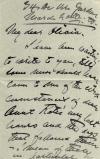 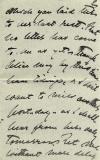 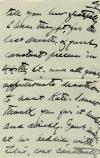 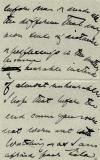 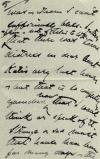 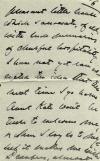 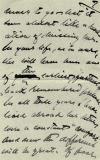 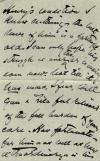 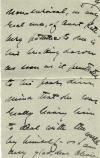 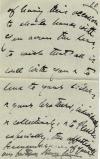 |
JAMES HENRY: (1843-1916) American-born British Author. A long A.L.S., Henry James, ten pages, 8vo, De Vere Gardens, 20th March n.y. (1889), to Miss. Olivia Walsh in Connecticutt. James states that he had been waiting to write to his correspondent until he had some news 'of dear Aunt Kate's very last hours and the days that followed them - I mean of those in particular in which you laid her to her last rest', although adding that no letter has arrived and he didn't want to miss the opportunity of another post-day as he will be moving the next day, continuing 'Let me without more delay tell you how gratefully I have thought for the last month of your constant presence in 44th St. and all your affectionate devotion to Aunt Kate…..Your image at her bedside….was constantly before me & made all the difference that my own sense of distance….in the matter became bearable instead of almost unbearable. I hope that before the end came you were not worn out with watching…..I gather….that there was some distress in dear Aunt Kate's very last hours….I won't think or speak of it…..the idea that the next time I go home Aunt Kate won't be there to welcome me, & when I say so to myself it makes me wish, I confess, almost never to go…', James further writes regarding the health of another individual, Henry, about which he has heard nothing for a fortnight, commenting on his reaction to Aunt Kate's passing, 'his breaking down as soon as it penetrated to his poor dim mind that she was really leaving him to deal with the world by himself'. The author concludes 'I am very glad, dear Olivia, of having this occasion to shake hands with you across the seas, to wish that all is well with you & to send to your sisters & your brothers, individually & collectively….the affectionate remembrances of yours….' Accompanied by the original envelope hand addressed by James. VG £250 - 350
|
|

|
WELLS H. G.: (1866-1946) English Writer of Science Fiction novels. A.L.S., with his initials H. G. W., to the verso of a picture postcard featuring an illustration of the entrance hall of the Royal Bath Hotel, n.p. (Bournemouth), n.d. (16th January 1934), to W. T. Bowden. Wells confirms an appointment with his correspondent on Thursday the 18th 'for fifteen minutes' and adds 'Bring this card because the Head Porter may intercept you unless you have something to show him'. Some very heavy, extensive foxing, G £80 - 100
|
|

|
BATES H. E.: (1905-1974) English Writer. Book signed and inscribed, a hardback edition of The Cruise of the Breadwinner, First Edition published by Michael Joseph Ltd., London, 1946. The slim volume has illustrated endpapers by Broom Lynne and is bound in the decorative black cloth with silver lettering to the spine. Signed and inscribed by Bates in blue fountain pen ink to the title page, 'For Jimmy Rushton, hoping that this story will give him a lasting pleasure as the house will give H. E. Bates' and dated 1946 in his hand. Together with a signed Christmas greetings card by Bates, the folding small 8vo card featuring a printed design by Franciszka Themerson. Signed by Bates (also adding the name of his wife, Madge, in his hand) to the inside beneath a printed greeting. Also including a few printed illustrated pages removed from a magazine relating to his home in Kent. Some light age wear, G to VG, 2 + magazine pages £100 - 120
|
|

|
LEE LAURIE: (1914-1997) English Poet & Novelist. Souvenir T.Q.S., Laurie Lee, one page, 8vo, n.p., n.d. The typed quotation is from Lee's most famous work, Cider with Rosie, and begins 'The day Rosie Burdock decided to take me in hand was a motionless day of summer, creamy, hazy, and amber-coloured….' Signed in blue ink with his name alone at the foot of the page. VG £80 - 100
|
|

|
SMITH DODIE: (1896-1990) English Novelist & Playwright. Souvenir T.Q.S., Dodie Smith, one page, small 4to, n.p., n.d. The typed quotation is from Smith's most famous work, The Hundred and One Dalmatians, and begins 'Not long ago, there lived in London a young married couple of Dalmatian Dogs named Pongo and Missis Pongo….' Signed in blue ink with her name alone at the conclusion. VG £80 - 100
|
|
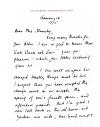 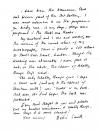 |
SMITH DODIE: (1896-1990) English Novelist & Playwright of The Hundred and One Dalmatians. A.L.S., Dodie Smith, two pages, small 4to, Finchingfield, Essex, 16th February 1975, to Mrs. Stanesby. Smith thanks her correspondent for her letter and remarks 'I am so glad to know that "Look Back With Love" [:a Manchester Childhood] gave you pleasure - which your letter certainly gave me.' She continues 'I can well imagine how changed Whalley Range must be but I suspect that you have accepted the changes much as one accepts the ageing of one's friends faces, and affection persists. But I'm glad I can look back on the old houses and gardens and wide, tree-lined roads' and further informs her correspondent that 'My husband and I are now working on...the second volume of my autobiography. There is quite a lot about St. Paul's Girls School, London. Though the teaching was admirable I never feel it had, on the whole, the class of Whalley Range High School.' VG £80 - 100
Look Back With Love: a Manchester Childhood was the first of four volumes of Smith's autobiography, published between 1974 - 85.
Sold on behalf of the charity Oxfam.
'I feel we can never be really civil to Americans again - but don't tell anyone!'
|
|
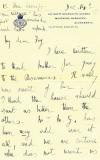 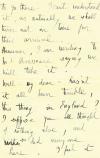 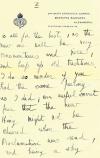 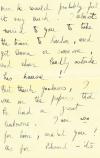 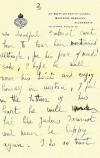 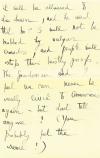 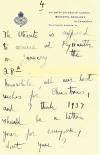 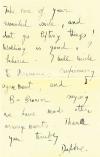 |
DU MAURIER DAPHNE: (1907-1989) British Author. An excellent, early A.L.S., Daphne, eight pages, 8vo, Mustapha Barracks, Alexandria, 14th December (1936), to 'My dear Foy' (Foy Quiller-Couch), on the printed stationery of the 2nd Battalion Grenadier Guards. Du Maurier informs her friend that she has written to her mother to thank her for her help with a home and continues to remark 'Well - my dear - hasn't it all been terrible, this thing in England? I suppose you all thought of nothing else, and so did everyone here. I feel it is all for the best, as the new one will be very conscientious and nice, and keep up old traditions. I do so wonder if you had the same feeling as I did; an awful secret fear that the new King might not be cheered when the Proclamation was read, and being a shy man he would probably feel it very much. I almost wired to you to take the train to London….and cheer loudly outside his house! But thank goodness, I see in the papers that he had a great welcome. I am so for him, aren't you? As for Edward - it's so dreadful I almost can't bear to hear him mentioned; although, for his peace of minds sake, I hope he will wear his beret and enjoy himself in Austria. I feel in the bottom of his heart he will feel like Judas Iscarriot (sic) and never be happy again. I do so trust it will be allowed to die down, and he and that Mrs. S. will not be mobbed by vulgar crowds, and people will stop their beastly gossip. The Guardsman (her husband, Frederick Browning) and I feel we can never be really civil to Americans again - but don't tell anyone! (You probably feel the same!)' She concludes by sending her best wishes for Christmas ('and I think 1937 should be a better year for everyone, don't you?') and again refers to the arrangements for renting a home when they return to England. Accompanied by the original envelope hand addressed by Du Maurier. A letter of wonderful content. VG £300 - 400
Foy Quiller-Couch - daughter of British writer Arthur Quiller-Couch (1863-1944), and a life-long friend of Du Maurier. Indeed, Du Maurier was accompanied by Foy Quiller-Couch when she became inspired with the storyline for her novel Jamaica Inn. Some years previously the two ladies were staying at Jamaica Inn and went riding on Bodmin Moor. They became lost in bad weather conditions and apparently sheltered for some time in a derelict cottage on the moor but were eventually led back to Jamaica Inn by their horses.
Frederick Browning (1896-1965) British Lieutenant-General of World War II, deputy commander of the First Allied Airborne Army in Operation Market Garden, 1944. Husband of the novelist Daphne Du Maurier.
Du Maurier writes in the immediate wake of one of the most important events in the history of the British monarchy. King Edward VIII had abdicated on 11th December 1936, just days before the present letter was written, in order to be able to marry his mistress, Wallis Simpson, an American divorcee. Edward's younger brother, King George VI, acceded to the throne and made a speech to the accession council on 13th December, a day before the present letter. The new King's dislike of public speaking is well documented, and was the subject of the film The King's Speech (2010).
|
|
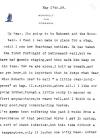 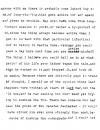 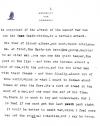 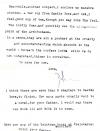 |
DU MAURIER DAPHNE: (1907-1989) British Author. T.L.S., Daphne, four pages, 8vo, Menabilly, Par, Cornwall, 27th May 1959, to 'My dear' (Foy Quiller-Couch). Du Maurier writes following the retirement of her husband, Frederick Browning, 'He has taken the first fortnight of retirement well, but we have had guests staying, and this made him keep on his toes. Now we are alone, I hold my breath, and as you know, it is important that he keeps what dear Miss Roberts used to call "a little over-indulgence" at bay (I.e. spirits, above all). I like our young Luther, though a little cocky in manner on first acquaintance, he wears well, and I think is a very good, very understanding doctor.' She also writes of her own health, and her work, 'But to return to Castle Dore. Perhaps you could pass a day here next time you are Assize-minded? The thing I believe you could tell me is at what period of his life your father began the tale, and when he worked on it, and dropped it, and took it up again. Because there are obviously gaps in train of thought. I myself am of the opinion those last chapters were written at start of last war, not the '14 one, and he was casting his mind back yet trying to combine the two. There was someone who had seen the youth of two decades decimated - it would have struck him even more strongly than most, because of knowing the undergrads, and I would not be surprised if the advent of the second war was not his death-stroke, to a certain extent' further adding 'His view of Linnet alters, you know, which intrigues me. At first the Hardy-ish heroine, young, married to an older man, one can see the quick temper, the pout on the lips - and then she becomes almost a kind of She, with the potion, and the two older men with their dreams - and then finally, almost out of this world, which is what I meant to Bozman about Woman or even the Muse, it's a sort of ideal in the mind of a man, and one near the end of his time. Oh, there is so much to try and understand. But I do feel if one cant get the last part right it would be better to ommit (sic) war, which I feel sure was not the original intention, but I may be wrong.' Du Maurier concludes 'Meanwhile, another subject, I enclose my macabre stories (no longer present) A far cry from Castle Dore, and not, I feel, your cup of tea, though you may like The Pool, The Lordly Ones, and possibly see the allegorical point of the Archduchess. In a sense, they are all a protest at the cruelty and misunderstanding which abounds in the world - beneath the surface lurk evils we do not understand, things in ourselves'. In a postscript Du Maurier returns to Castle Dor, 'I think there are more than 5 chapters to Castle Dore, to finish. How many parts usually went to a novel, for your father. I would say there was Book III and Book I4 to come. Have you any of the Tristram books at Trelowarren which your father consulted?'. EX £150 - 200
Foy Quiller-Couch - daughter of British writer Arthur Quiller-Couch (1863-1944), and a life-long friend of Du Maurier. Indeed, Du Maurier was accompanied by Foy Quiller-Couch when she became inspired with the storyline for her novel Jamaica Inn. Some years previously the two ladies were staying at Jamaica Inn and went riding on Bodmin Moor. They became lost in bad weather conditions and apparently sheltered for some time in a derelict cottage on the moor but were eventually led back to Jamaica Inn by their horses.
Frederick Browning (1896-1965) British Lieutenant-General of World War II, deputy commander of the First Allied Airborne Army in Operation Market Garden, 1944. Husband of the novelist Daphne Du Maurier. Browning, a heavy drinker, suffered a nervous breakdown in July 1957 as a result of his chronic alcoholism, which in turn resulted in his resignation from his position at Buckingham Palace in 1959.
Castle Dor is a historical novel which was not completed by Arthur Quiller-Couch at the time of his death. Du Maurier completed the work, at the request of Foy Quiller-Couch, which was published in 1961. The story is based around the legend of Tristan and Iseult, although set in 19th century Cornwall.
Du Maurier also refers to her anthology The Breaking Point (1959), a collection of eight short stories which were written at a time when the novelist herself came close to a serious nervous breakdown and reflect her own psychological stress.
|
|
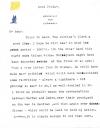 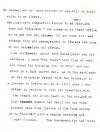 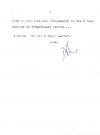 |
DU MAURIER DAPHNE: (1907-1989) British Author. T.L.S., Daphne, three pages, 8vo, Menabilly, Par, Cornwall, n.d. ('Good Friday', c.1960), to 'My dear' (Foy Quiller-Couch). Du Maurier writes regarding her work Castle Dor, 'The Justice's Clerk a good idea. I hope he will bear in mind the period - 1860's. (On the other hand this might make things worse. Foreigners might have been deported at the flick of an eye!)' continuing 'What a nice letter from Mr. Bozman. He could have made many quibbles which would have necessitated some re-writing - always a nightmare - but pruning is easy to do, I am well trained in it. I think he probably means the conversations between Carfax and Ledru, over their punch, and on the way to Lantvan, and then again over dinner - which could be said to hold up action. Anyway, it is simple enough to cut them down'. Du Maurier also writes of social matters and her family, 'I hate "the roads" this time of year, and dread the whizzing down of Kits' and his crony in a fast sports car. As to the gentleman at the Palace, or rather from the Palace, it is a quarter to twelve and he is still abed - our Esther is waiting to cook his breakfast, with the steaks for lunch ready in the pan…..The Guardsman, for the first time in his life, has disappeared to the 3 hour service at Tywardreath church….' One small tape stain to the upper edge of the first page, not affecting the text or signature, otherwise VG £100 - 150
Foy Quiller-Couch - daughter of British writer Arthur Quiller-Couch (1863-1944), and a life-long friend of Du Maurier. Indeed, Du Maurier was accompanied by Foy Quiller-Couch when she became inspired with the storyline for her novel Jamaica Inn. Some years previously the two ladies were staying at Jamaica Inn and went riding on Bodmin Moor. They became lost in bad weather conditions and apparently sheltered for some time in a derelict cottage on the moor but were eventually led back to Jamaica Inn by their horses.
Castle Dor is a historical novel which was not completed by Arthur Quiller-Couch at the time of his death. Du Maurier completed the work, at the request of Foy Quiller-Couch, which was published in 1961. The story is based around the legend of Tristan and Iseult, although set in 19th century Cornwall.
|
|

|
DU MAURIER DAPHNE: (1907-1989) British Author. A.L.S., Daphne, one page, 8vo, Menabilly, Par, Cornwall, n.d. (c.1960), to Foy (Quiller-Couch). Du Maurier writes, in full, 'Herewith spare complete set of Books I and II (no longer present). Not the set I worked from (with the exception of chapter XIII) so no need to return.', and in a postscript adds 'Dr Carfax not mentioned in this copy of Prologue, but is in other version'. A couple of heavy creases to the lower left corner, only very slightly affecting the text but not the signature, about VG £100 - 150
Foy Quiller-Couch - daughter of British writer Arthur Quiller-Couch (1863-1944), and a life-long friend of Du Maurier. Indeed, Du Maurier was accompanied by Foy Quiller-Couch when she became inspired with the storyline for her novel Jamaica Inn. Some years previously the two ladies were staying at Jamaica Inn and went riding on Bodmin Moor. They became lost in bad weather conditions and apparently sheltered for some time in a derelict cottage on the moor but were eventually led back to Jamaica Inn by their horses.
Du Maurier clearly writes in connection with her work on Castle Dor, a historical novel which was not completed by Arthur Quiller-Couch at the time of his death. Du Maurier completed the work, at the request of Foy Quiller-Couch, which was published in 1961. The story is based around the legend of Tristan and Iseult, although set in 19th century Cornwall.
|
|
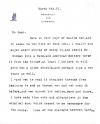 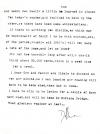 |
DU MAURIER DAPHNE: (1907-1989) British Author. T.L.S., Daphne, two pages, 8vo, Menabilly, Par, Cornwall, 4th March 1961, to 'My dear' (Foy Quiller-Couch). Du Maurier announces 'Here is your copy of Castle Dor (no longer present) and it comes to you with my fond love' and continues 'I really did enjoy every minute of doing it, and should Mr. Bozman pull a face, and American editors threw it from the window, at least I believe it will give you a quiet chuckle, and perhaps pipe a few tears as well. I want you to read it straight through from beginning to end as though you have not seen it before, and you cannot but notice, here and there, I have made tiny cuts and alterations in the original m.s. which seemed to me necessary for the whole'. She further writes 'Some of the dialogue between Carfax and Ledru was really a little too learned in places for today's reader, and inclined to hold up the story, so there have been some abbreviations. If there is anything you dislike, or think may be technically at fault (to do with customs, etc, of the period, roughly mid 1860s) will you make a note of the page, and let me know? Its not too terribly long after all, I should think about 95,000 words, which is a good size for a novel.' VG £100 - 150
Foy Quiller-Couch - daughter of British writer Arthur Quiller-Couch (1863-1944), and a life-long friend of Du Maurier. Indeed, Du Maurier was accompanied by Foy Quiller-Couch when she became inspired with the storyline for her novel Jamaica Inn. Some years previously the two ladies were staying at Jamaica Inn and went riding on Bodmin Moor. They became lost in bad weather conditions and apparently sheltered for some time in a derelict cottage on the moor but were eventually led back to Jamaica Inn by their horses.
Castle Dor is a historical novel which was not completed by Arthur Quiller-Couch at the time of his death. Du Maurier completed the work, at the request of Foy Quiller-Couch, which was published in 1961. The story is based around the legend of Tristan and Iseult, although set in 19th century Cornwall.
|
|
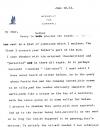 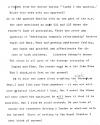 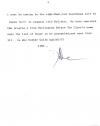 |
DU MAURIER DAPHNE: (1907-1989) British Author. T.L.S., Daphne, three pages, 8vo, Menabilly, Par, Cornwall, 20th June 1961, to 'My dear' (Foy Quiller-Couch). Du Maurier apologises for disturbing her friend and sends a list of questions (no longer present) from the publishers Dent, commenting 'The first 3 concern your father's part of the m.s. I have checked with his original (handwritten) and "purcelled" is there all right. Is it perhaps Cornish? Likewise "list-shot"? I must admit I have never heard of either before. As to the query about Castle Dor and the runaway horses, this seems to me silly, and the reader obviously imagines the earth-work like a cirque on the top of a mountain, with the races going on in some valley far below. I propose to dismiss this query, with your approval. And as to the doctor being late, naturally no one sent in to Troy for him, he happened to be passing, that's obvious. To satisfy the nit-wit reader I can interpose a remark from the doctor saying "Lucky I was passing". Would this meet with your approval?'. She further continues 'As to the queries dealing with my own part of the m.s. the ones mentioned on page 222 and 225 shows the reader's lack of perception. There was never any question of "developing romantic relationship" between Amyot and Mary. Mary had growing adolescent feeling, and Amyot was grateful and affectionate for the love of both children. Likewise Johnny's dream. The dream is all part of the strange interplay of legend and Time. The reader must be a bit like Miss Tod I think, with feet on the ground!' Du Maurier concludes by referring to the question of two horses driving a landau and also mentions her husband. About EX £150 - 200
Foy Quiller-Couch - daughter of British writer Arthur Quiller-Couch (1863-1944), and a life-long friend of Du Maurier. Indeed, Du Maurier was accompanied by Foy Quiller-Couch when she became inspired with the storyline for her novel Jamaica Inn. Some years previously the two ladies were staying at Jamaica Inn and went riding on Bodmin Moor. They became lost in bad weather conditions and apparently sheltered for some time in a derelict cottage on the moor but were eventually led back to Jamaica Inn by their horses.
Castle Dor is a historical novel which was not completed by Arthur Quiller-Couch at the time of his death. Du Maurier completed the work, at the request of Foy Quiller-Couch, which was published in 1961. The story is based around the legend of Tristan and Iseult, although set in 19th century Cornwall.
|
|

|
DU MAURIER DAPHNE: (1907-1989) British Author. A good A.Q.S., Daphne du Maurier, one page, 8vo, Kilmarth, Par, Cornwall, 7th February 1986. Du Maurier has penned a brief quotation, 'Last night I went to Manderley again', which she identifies as being from her work Rebecca (1938). At the foot of the page the author has added a further note, signed with her initials, D du M, stating, in part, 'I enjoyed all the Bronte novels'. VG £100 - 150
|
|

|
SCOTT WALTER: (1771-1832) Scottish Novelist. Final page of an A.L.S., Walter Scott, one page, 4to, Ashestiel, 15th August 1809, to Lady Douglas. The concluding page of Scott's letter begins '& who from that single circumstance he contends must have been the ancestor of William de Duglas who flourished about 1170. Unfortunately for this learned gentleman's hypothesis it happens that the lands possessed by this Theobald never made any part of the Barony of Duglas & consequently there is not the most slight foundation for saying he had anything to do with the family. I beg leave to congratulate your Ladyship & Lord Douglas on this discovery'. Scott further adds that he will write to Lady Louisa very soon and remarks 'I hope Miss Douglas does not suffer her pencil to contract dust. Were I clergyman at Bothwell I would preach on the text of the....talent till she exerted herself out of mere shame' and in a postscript writes 'It is with great astonishment & some disbelief of my eyes that I saw Woodhall in the papers for sale. How is Lady Charlotte when your Ladyship heard from her?'. With address panel to the verso bearing a good red wax seal (small area of paper loss to the left edge, where originally broken, not affecting the text or signature). VG £200 - 300
|
|

|
DOYLE ARTHUR CONAN: (1859-1930) Scottish Author, creator of Sherlock Holmes. Dark fountain pen ink signature ('Arthur Conan Doyle') and three additional words in his hand on a piece slightly irregularly clipped from the conclusion of a letter. VG £100 - 150
|
|

|
DOYLE ARTHUR CONAN: (1859-1930) Scottish Author, creator of Sherlock Holmes. Brief A.L.S., Arthur Conan Doyle, one page, 8vo, Old Ship Hotel, Brighton, n.d., to a gentleman. Doyle thanks his correspondent for their kindness. Neatly laid down to a page removed from an autograph album, otherwise VG £150 - 200
|
|

|
CHRISTIE AGATHA: (1890-1976) English Crime Writer. Book signed, a hardback edition of A Pocket Full of Rye, First Edition published for The Crime Club by Collins, London, 1953. Signed by Christie in blue ink with her name alone to the front free endpaper. Bound in red-orange cloth and with black title to the spine. Lacking the dust jacket. Some light staining, fading and age toning to the cloth and the front free endpaper with some extremely light age toning, otherwise about VG £200 - 300
'…I think some archaic phrasing is
always relished…'
|
|
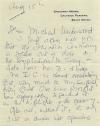 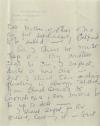 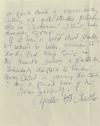 |
CHRISTIE AGATHA: (1890-1976) English Crime Writer. A.L.S., Agatha Christie, three pages, 8vo, Churston Ferrers, South Devon, 15th August n.y., to Michael Underwood. Christie announces 'I quite agree with you that the Initiation (?) Ceremony is rather out of date & the temptation to say let's have no. 3. & have no I.C. is almost overwhelming' and continues 'But, very much to my surprise, every guest I've ever brought has apparently regarded it as the highlight of the evening. After all, without it, its only just a dinner with speeches like masses of others & no one feels particularly gratified to be asked.' Christie therefore concludes that the ceremony should be kept for now, although maybe adapted in the future, further reflecting 'But I think some archaic phrasing is always relished from Church services to Coronations, they mustn't be too up to date….If it was a good deal shorter, it would be better, easier to read, but keep Eric [the Skull] the mumbo jumbo & procession'. She concludes by remarking 'Particularly delighted to hear Henry Cecil is joining the club. I am a great fan of his'. VG £200 - 300
Christie writes regarding The Detection Club which had been formed in 1930 and of which she served as President from 1957-76. On being inaugurated into the club, members are required to swear to an oath ('Do you promise that your detectives shall well and truly detect the crimes presented to them using those wits which it may please you to bestow upon them and not placing reliance on nor making use of Divine Revelation, Feminine Intuition, Mumbo Jumbo, Jiggery-Pokery, Coincidence, or Act of God?') upon Eric the Skull.
Henry Cecil Leon (1902-1976) British Judge and Writer (using the pen names Henry Cecil and Clifford Maxwell) of fiction about the British legal system.
|
|

|
CHRISTIE AGATHA: (1890-1976) English Crime Writer. T.L.S., Agatha Christie Mallowan, one page, 8vo, Wallingford, Berkshire, 26th July 1972, to Mr. Thompson. Christie states that her correspondent's letter 'enclosing two copies of the second impression of your booklet on Abney Hall' may have been overlooked as she was away from home, although concludes by remarking 'I think it is a very nicely produced booklet on Abney Hall which I am very glad to have.' VG £200 - 300
Agatha Christie was a frequent visitor to Abney Hall, a substantial Victorian property in Cheadle, the last private owner of which was her brother-in-law, James Watts. Indeed, Christie found much inspiration from the building and wrote two works there, the novel After the Funeral and the short story The Adventure of the Christmas Pudding.
'I will see to it that James Bond eats the right kind of butter…'
|
|

|
FLEMING IAN: (1908-1964) British Author, creator of James Bond. A good T.L.S., Ian Fleming, one page, 8vo, Old Mitre Court, Fleet Street, 10th September 1963, to Dr. Mary K. Williams. Fleming thanks his correspondent for their cautionary letter and remarks 'I will see to it that James Bond eats the right kind of butter in future', concluding 'But I am terribly sorry to hear of your misfortune, and I send you my and James Bond's wishes for an early recovery'. Accompanied by the original envelope. A desirable letter for its references to James Bond. About EX £600 - 800
In Fleming's novel From Russia, With Love (1957) it is revealed that James Bond's favourite meal of the day is breakfast which included a boiled egg and coffee, as well as wholewheat toast with Jersey butter.
Fleming's letter is written in the same year that his tenth James Bond novel, On Her Majesty's Secret Service was published and the second James Bond film, From Russia With Love, was released, starring Sean Connery.
|
|

|
BURGESS ANTHONY: (1917-1993) British Novelist of A Clockwork Orange (1962). Book signed and inscribed, a paperback edition of A Clockwork Orange, published by Penguin Books, 1977. Signed by Burgess in black ink to the title page. Together with a scarce signed VHS video tape of Stanley Kubrick's A Clockwork Orange, the Warner Home Video issued in Holland in 1988 (the film having been withdrawn from circulation in Great Britain in 1972 and screenings only permitted again in 1999), signed by Burgess in black ink with his name alone to a clear area of the cover, also including a signed and inscribed paperback edition of The Doctor is Sick by Anthony Burgess, published by Pan Books Ltd., London, 1963, and further including a signed and inscribed hardback edition of The End of the World News - An Entertainment by Anthony Burgess, First Edition published by Hutchinson & Co., London, 1982. Accompanied by the dust jacket. G to VG, 4 £100 - 120
|
|
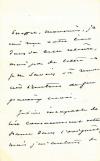 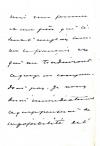 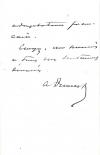 |
DUMAS ALEXANDRE: Fils (1824-1895) French Author and Dramatist. A.L.S., A Dumas f, three pages, 8vo, n.p., n.d., to a gentleman, in French. Dumas confirms that he had received his correspondent's 'handsomely bound book' although there was no accompanying letter and therefore did not know 'where to write and thank the author for his gracious present'. He continues 'I do not have the skill to read your play in the original at speed, but I have a wife and daughter who read English like French and who will translate for me what I do not understand. I will tell you straightaway what I think of the possibility of adapting it to French'. About EX £100 - 150
|
|

|
DUMAS ALEXANDRE: Fils (1824-1895) French Author and Dramatist. Autograph Statement Signed, A Dumas f, one page, 8vo, n.p., n.d., in French. Dumas writes 'Only make anonymous charitable gifts; they have a double advantage: they avoid ingratitude and prevent abuse'. With blank integral leaf. Some very light creasing to the right edge, only very slightly affecting the text and signature, otherwise VG £100 - 120
|
|

|
DUMAS ALEXANDRE: Fils (1824-1895) French Author and Dramatist. Autograph Statement Signed, A. Dumas f, one page, 8vo, n.p., n.d., in French. Dumas writes, in full, 'One should only give alms anonymously. Not only are these most favoured gifts in the eyes of God, but they have the additional advantage of protecting one from ingratitude and repeated demands'. With blank integral leaf. One small, neat split at a fold, only very slightly affecting one letter of text and not the signature, otherwise VG £100 - 120
|
|

|
DUMAS ALEXANDRE: Fils (1824-1895) French Author and Dramatist. A.L.S., A Dumas f, one page, 8vo, n.p., n.d., to Mr. Meyer, in French. Dumas states that he is touched that his correspondent has been in touch again and adds that he 'shall do everything I can to prolong our acquaintance', further adding 'The letter you sent me in the course of 1892 was for me one of the rare joys of that particular year'. With blank integral leaf. About EX £100 - 150
|
|

|
WILDER THORNTON: (1897-1975) American Playwright & Novelist. Book signed and inscribed, a hardback edition of Heaven's My Destination, published by Harper & Brothers, New York, 1935. Signed by Wilder in blue fountain pen ink to the title page, 'Countess Dagmar Alvarez de Toledo, with the regards of - and expectation of many congenial hours conversation, Cordially, Thornton Wilder' and dated Hamden, Connecticut, November 1958 in his hand. Bound in blue cloth with gilt title and decoartion etc. to spine. Lacking the dust jacket. Together with Harold Acton (1904-1994) British Writer & Scholar. Book signed and inscribed, a hardback edition of Memoirs of an Aesthete, First Edition published by Methuen & Co. Ltd., London, 1948. Signed by Acton in bold blue fountain pen ink to the front free endpaper, 'To Dagmar Alvarez de Toledo y de Avella, with happy memories of both and all best wishes from Harold Acton'. Bound in pale blue cloth. Lacking the dust jacket. Generally VG, 2 £100 - 150
|
|

|
SIGNED BOOKS: Selection of signed hardback (4) and paperback (19) books by various writers and novelists including Mothers and Daughters by Evan Hunter, QB VII and Battle Cry by Leon Uris, Day of Judgment by Jack Higgins, Whirlwind and Noble House by James Clavell, Kane and Abel, First Among Equals and two other titles by Jeffrey Archer, The Onion Field, The Blue Knight, The New Centurions and two other titles by Joseph Wambaugh, Lair, The Magic Cottage, Moon, The Dark, The Spear and three other titles by James Herbert etc. Each of the hardback editions are accompanied by the dust jackets. All with some signs of age wear, many of the paperbacks with creasing etc., to the covers, FR to generally G, 23 £100 - 120
| EMINENT & INFAMOUS MEN & WOMEN | |
|

|
POLE REGINALD: (1500-1558) English Cardinal of the Catholic Church, the last Catholic Archbishop of Canterbury 1556-58 during the Counter Reformation. Rare L.S., Reg Carlus. Polus, one page, folio, Carpentras, 16th April 1539, to 'Your Holiness'. Pole states that he received the letter from his correspondent 'through which I learnt that the letters which I wrote from Toledo on the 22nd February only arrived on the 7th April, which I find astonishing' and continues 'I don't know what could have caused such delay. Through no fault of my own, I must appear negligent towards Your Holiness in this extremely important matter, about which I am most anxious and solicitous, as I should be in any case. This will have some bearing on my letters….and then, in relation to the Abbot, who left here on the 8th, and very much hoped to be reunited with Your Holiness before my letters arrive, concerning everything that has been deduced from their two Majesties, regarding the English negotiation.' The Cardinal further comments 'As for me, I needed to record this material. Nothing else has happened, except that I am waiting here for the opinion of His Holiness on my loyalty and obedience. Moreover, I am struggling hard to elect what I must do for the service of God, and to gain his benediction.' With integral address leaf. Some very slight, minor staining, otherwise a bold, attractively penned and clean letter, VG £1000 - 1500
At the time of writing this letter Pole had been attainted in absentia following his disagreement with King Henry VIII, to whom he had not offered his support in his divorce from Catherine of Aragon, despite the King's offer of the Archbishopric of York or the Diocese of Winchester.
|
|

